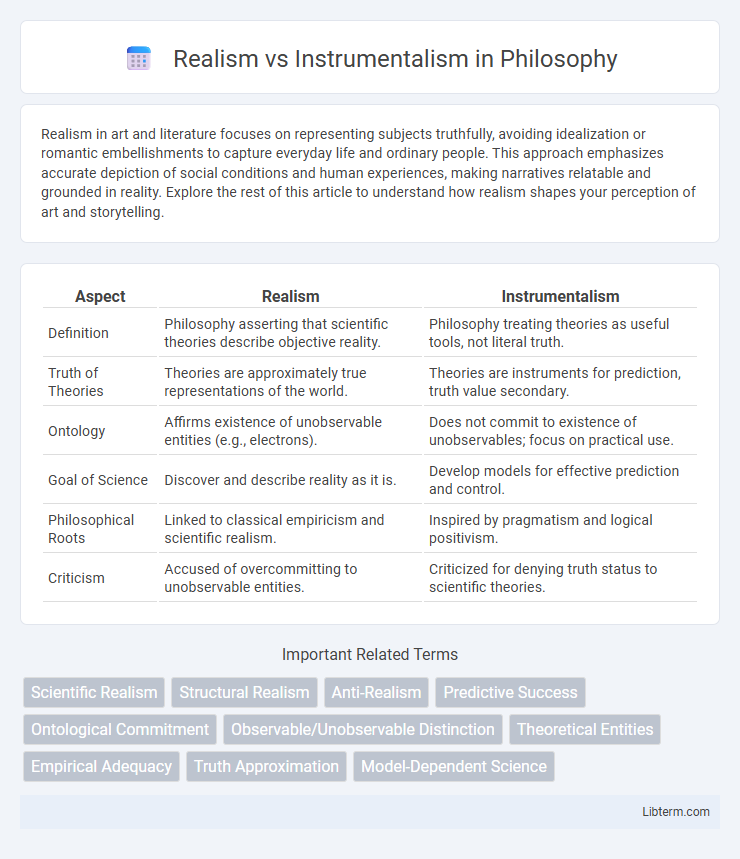Realism in art and literature focuses on representing subjects truthfully, avoiding idealization or romantic embellishments to capture everyday life and ordinary people. This approach emphasizes accurate depiction of social conditions and human experiences, making narratives relatable and grounded in reality. Explore the rest of this article to understand how realism shapes your perception of art and storytelling.
Table of Comparison
| Aspect | Realism | Instrumentalism |
|---|---|---|
| Definition | Philosophy asserting that scientific theories describe objective reality. | Philosophy treating theories as useful tools, not literal truth. |
| Truth of Theories | Theories are approximately true representations of the world. | Theories are instruments for prediction, truth value secondary. |
| Ontology | Affirms existence of unobservable entities (e.g., electrons). | Does not commit to existence of unobservables; focus on practical use. |
| Goal of Science | Discover and describe reality as it is. | Develop models for effective prediction and control. |
| Philosophical Roots | Linked to classical empiricism and scientific realism. | Inspired by pragmatism and logical positivism. |
| Criticism | Accused of overcommitting to unobservable entities. | Criticized for denying truth status to scientific theories. |
Introduction to Realism and Instrumentalism
Realism asserts that scientific theories aim to describe an objective reality, believing that unobservable entities posited by these theories genuinely exist. Instrumentalism treats scientific theories primarily as tools for predicting observable phenomena without commitment to the literal truth of unobservable components. This philosophical debate centers on whether theoretical constructs correspond to actual entities or serve merely as instruments for empirical success.
Defining Philosophical Realism
Philosophical realism asserts that an external reality exists independently of human thoughts or perceptions, emphasizing the objective truth of the world's entities and their properties. It contrasts with instrumentalism, which views scientific theories as mere tools for predicting observations without claiming truth about the underlying reality. Realism holds that scientific theories aim to describe and explain the actual structures and mechanisms of the world, making truth a central criterion for theory evaluation.
Understanding Instrumentalism in Science
Instrumentalism in science emphasizes the predictive power of theories rather than their literal truth, viewing scientific models as tools for organizing observations and making accurate predictions. This perspective prioritizes empirical adequacy, where the usefulness of a theory in explaining and forecasting phenomena outweighs concerns about its ontological commitments. Instrumentalism contrasts with realism by rejecting the necessity to assert the actual existence of theoretical entities, focusing instead on the practical application of scientific concepts.
Historical Origins and Development
Realism in philosophy of science originated in the early 20th century, rooted in the belief that scientific theories describe an objective reality independent of human perception. Instrumentalism emerged as a response during the same period, emphasizing that scientific theories are mere tools for predicting observations rather than accurate representations of the world. The development of logical positivism and the debates between figures such as Pierre Duhem, Ernst Mach, and later Bas van Fraassen significantly shaped the evolution of both viewpoints in the philosophy of science.
Key Differences Between Realism and Instrumentalism
Realism posits that scientific theories describe an objective reality that exists independently of human perception, asserting the truth of theoretical entities. Instrumentalism views scientific theories as mere tools for predicting observable phenomena without making claims about the actual existence of unobservable entities. The key difference lies in realism's commitment to truth and ontology, contrasted with instrumentalism's pragmatic emphasis on usefulness and empirical adequacy.
Major Proponents and Influential Thinkers
Realism, championed by philosophers such as Aristotle and contemporary scientist Hilary Putnam, asserts that scientific theories describe an objective reality independent of human perception. Instrumentalism, supported by thinkers like John Dewey and Bas van Fraassen, views theories as useful tools for predicting phenomena without necessarily revealing true underlying entities. These influential figures have shaped ongoing debates on whether scientific models reflect truth or function merely as instruments for organizing experience.
Applications in Scientific Theories
Realism in scientific theories asserts that theoretical entities and structures genuinely exist and accurately describe the world, guiding empirical research and technological advancements. Instrumentalism treats scientific theories as tools for predicting phenomena without claiming true representation, emphasizing practical utility in hypothesis testing and model-building. Both perspectives influence the development and application of scientific methodologies across fields such as physics, biology, and chemistry.
Criticisms and Challenges of Each Approach
Realism faces criticism for its reliance on the existence of unobservable entities, which some argue leads to metaphysical commitments that cannot be empirically verified. Instrumentalism is challenged for potentially reducing scientific theories to mere predictive tools, thereby neglecting the quest for true explanations about the nature of reality. Both approaches grapple with issues regarding the interpretation of scientific progress and the status of theoretical terms in scientific practice.
Impact on Scientific Progress and Methodology
Realism posits that scientific theories describe an objective reality, fostering rigorous hypothesis testing and cumulative knowledge that drives scientific progress. Instrumentalism views theories as tools for predicting phenomena without asserting truth, prioritizing practical efficacy over ontological claims, which can streamline methodology but may limit deeper explanatory frameworks. The interplay between these perspectives influences experimental design, interpretation of results, and the evolution of scientific paradigms.
Conclusion: Implications for Science and Philosophy
Realism asserts that scientific theories truthfully describe an objective reality, shaping philosophy by emphasizing truth and knowledge discovery. Instrumentalism treats theories as predictive tools without commitment to their literal truth, influencing science to prioritize utility and empirical success over metaphysical debates. This dichotomy impacts scientific methodology and the philosophy of science, affecting interpretation, theory acceptance, and the role of models in advancing knowledge.
Realism Infographic

 libterm.com
libterm.com